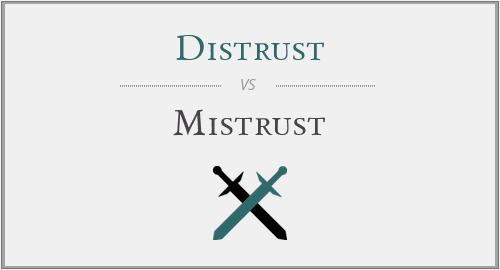Most of the words that are spelled similarly in English are either slight variations between British and American English, or completely different words with distinct definitions which have a random huge similarity in their spellings. But some of them actually do mean the same and allow the user to make his personal choice for the preferred spelling, without any effect upon the final message.
One example of such a pair of words is "distrust" and "mistrust". Ever thought that something makes these different or that one is a misspelling? It's not the case. "Distrust" can always replace "mistrust" with no other consequence or rule than personal choice.
Distrust vs. Mistrust
You might also think that one is the verb and one is the noun. Again, no, this is not a difference. Both words are basically nouns that can also be used as verbs with the same meaning. But they still remain synonyms.
According to all dictionaries, "distrust" is used when referring to not trusting someone or something; whereas "mistrust" refers to the same concept, the same feeling of not believing or having confidence in something or somebody. So as you can see, both words have identical definitions, which makes them a pair of perfect synonyms in English. "Distrust" and "mistrust" are two of the rare English words that have so similar spellings and can still be replaced one with the other anytime, with no restriction or consequence.
When do we use "distrust"?
Both "distrust" and "mistrust" are most commonly used as nouns, rarely as verbs. So you will most probably find or use them as nouns, in contexts where somebody does not trust something or someone else.
Example: My parents had a deep distrust for strangers. - "distrust" is used to define a lack of trust.
When do we use "mistrust"?
"Mistrust" is used with the same meaning as "distrust" and in the same context, as a noun. If we were, anyway, to find the most subtle difference between the contexts where "distrust" or "mistrust" would be more appropriate, that would be that "mistrust" is more often used to describe the missing of trust, the doubt, while "distrust" refers more to strictly not agreeing or not having confidence in something or someone.
Example: My parents' mistrust in technology disappeared when they saw how they were able to actually see me in a video call even though I was on another continent. - "mistrust" defines the inexistence of confidence or trust.
Conclusion
Overall, there is no notable difference between "distrust" and "mistrust", no rule or dictionary definition to restrict the use of these words or to subtly indicate that one suits better than the other in certain situations. So in the end, it is up to you whether you prefer to use "distrust" or "mistrust" in your daily conversations - your message will remain unchanged and correctly spelled.





Have a discussion about this article with the community:
Report Comment
We're doing our best to make sure our content is useful, accurate and safe.
If by any chance you spot an inappropriate comment while navigating through our website please use this form to let us know, and we'll take care of it shortly.
Attachment
You need to be logged in to favorite.
Log In